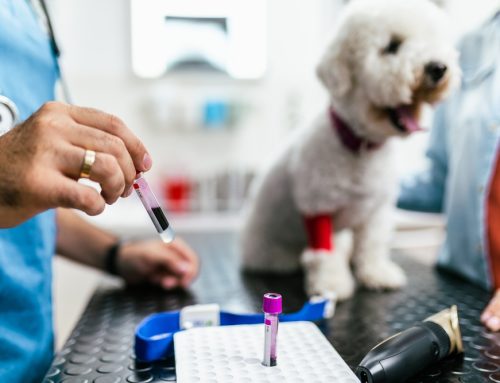Parasites feed on animals and people, and some can cause serious health issues in pets. Our team at Marcy Veterinary Clinic wants to help by providing information about parasitic diseases that can affect pets, and how you can protect your four-legged family member.
Heartworm disease in pets
Dirofilaria immitis (i.e. heartworms) are parasitic roundworms that can damage a pet’s heart and lungs. Factors to know about heartworms include:
- Transmission — Dogs and wild canids are natural heartworm hosts, which means the parasite can complete their life-cycle while parasitizing these animals. When a mosquito takes a blood meal from an infected natural host, they ingest baby heartworms (i.e., microfilariae). Once the baby heartworms have matured to an infective stage, the mosquito transmits them to another pet when taking its next blood meal.
- Damage — Heartworms affect cats and dogs differently, since cats aren’t natural hosts.
- Dogs — The parasites lodge in the dog’s lung vasculature, causing fibrosis and scarring, and then a high pressure area that makes the heart work harder to effectively pump blood. Eventually, the pressure becomes too much, and heart failure occurs. In the initial stages, many dogs show no signs, but as the disease progresses, signs include lethargy, a persistent soft cough, and abdominal distention.
- Cats — When the heartworm larvae reach the cat’s lungs, their immune system strongly responds, causing excessive inflammation, and resulting in a condition called heartworm associated respiratory disease (HARD). Signs are similar to feline asthma and include difficulty breathing, panting, and wheezing.
- Diagnosis — In dogs, blood tests that detect adult female heartworms are used to diagnose the condition, while in cats, who are difficult to diagnose, a blood test that detects antibodies against heartworms is used. X-ray and ultrasound imaging may also be necessary.
- Treatment —In dogs, a sudden worm die-off can have life-threatening consequences, so the pet’s condition is first stabilized and medications administered carefully over several months to kill the parasites in all life stages. No heartworm disease medications are approved for cats, and treatment focuses on supportive care.
- Prevention — Preventing heartworm disease involves administering year-round heartworm prevention medication.
Lyme disease in pets
Lyme disease is caused by the bacteria Borrelia burgdorferi, and is highly prevalent in the Northeast and upper mid-western states. Factors to know about Lyme disease include:
- Transmission — Lyme disease is transmitted through an infected blacklegged tick’s bite after the tick has been attached for at least 24 hours.
- Damage — The bacteria migrate from the tick’s bite wound throughout the body via the lymphatics, causing an inflammatory reaction in the lymph nodes and other organs. Signs typically occur two to five months after infection, and include swollen lymph nodes, joint swelling, fatigue, and decreased appetite, and serious kidney complications in severe cases.
- Diagnosis — Serologic blood tests can determine if your pet has been exposed to Lyme disease, and antibody profiles can indicate if they have been recently infected or their condition is chronic.
- Treatment — Lyme disease is treated using a specific antibiotic class. Supportive care may also be necessary if your pet’s kidneys are affected.
- Prevention — Always check your pet for ticks after being outside, and remove them as soon as possible. Ticks can attach anywhere, but common locations include your pet’s groin, under their tail, between their toes, and under their collar. You can ensure your pet is protected with a year-round tick prevention medication. A Lyme vaccine is available for dogs—ask our veterinary professionals if you should consider this for your pet.
Roundworms in pets

Roundworms are the most common parasitic disease in pets. Toxocara canis and Toxascaris leonina are two species that affect pets, and T. canis can also be transmitted to humans. Factors to know about roundworms include:
- Transmission — Roundworms can be transmitted in multiple ways. Encysted larvae can cross the placenta to infect unborn pets, and newborn pets can be infected by drinking their infected mother’s milk. In addition, pets can be infected if they contact microscopic roundworm eggs in their environment. Eating an infected rodent or bird can also lead to infection.
- Damage — Roundworms live in the intestinal tract and eat partially digested food. They are mostly a concern for puppies, whose signs include stunted growth, a pot-bellied appearance, and recurrent diarrhea, and coughing if the larvae migrate through the lungs.
- Diagnosis — Adult roundworms are sometimes found in a pet’s vomit or feces, while the eggs can be found by microscopically evaluating an infected pet’s feces.
- Treatment — An appropriate deworming medication is necessary to treat roundworms, and several safe products are available.
- Prevention — Remove your pet’s feces from the environment as soon as possible, to prevent spread and transmission. Prevent your pet from contacting other pets’ or animals’ fecal matter, and from eating birds and small mammals. Many heartworm prevention medications also protect pets against roundworms, so ensure your pet receives year-round prevention medication, and that their feces are checked at least once a year.
Providing year-round parasite prevention medication against fleas, ticks, heartworms, and intestinal parasites is the best way to protect your pet from many common parasitic diseases. If your pet is due for a heartworm test or a fecal check, or if you need a preventive refill, contact our team at Marcy Veterinary Clinic to schedule an appointment.








Leave A Comment